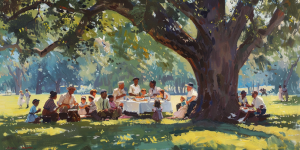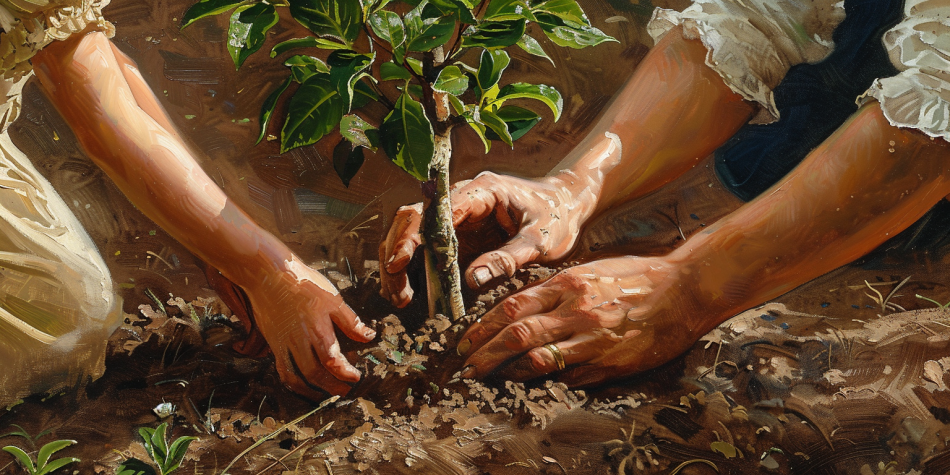Author’s note: The American Families of Faith project participants’ names are pseudonyms to protect identity.
Charlotte Brontë is renowned for her beloved classic Jane Eyre, but in her lesser-known novel Shirley, she offered valuable insight into the noble quality of gratitude when she wrote:
I am almost contented just now, and very thankful. Gratitude is a divine emotion: it fills the heart, but not to bursting; it warms it, but not to fever.
Our recent research as social scientists indicates that for many, “Gratitude is a divine emotion.” Although we did not ask directly about gratitude, many participants spontaneously discussed gratitude in their spiritual lives and their relationships.
Gratitude, however, is far more than an emotion. Over the past twenty-three years, our in-depth interviews with about 200 exemplary, marriage-based families for the American Families of Faith National Research Project have indicated that gratitude seems to frequently serve as a “gateway virtue,” a proverbial on-ramp to a freeway of other positive attributes and relational processes. In short, gratitude seems to be a catalyst for other “goods or values.” Here, we excerpt some of our participants’ gratitude-related revelations and interview gems.
Theme 1: Aspects of Gratitude
Two aspects of gratitude, functional and directional, were described by the 476 parents and their adolescent children in our study. The functional aspect emerged as individuals and families spoke of what they were grateful “for,” including blessings, religious faith, family, and God’s influence in their lives and relationships. We will italicize some words and phrases for emphasis.
Eric, a Presbyterian teenage son, spoke of the gratitude he felt for his parents’ examples. He shared:
I really feel like I am very open and willing to model the behavior that I’ve seen in my parents. And the consistency of a positive relationship…. It’s made me aware of how thankful I am to have two parents who, even on bad days and even when they might feel like they just want to tear each other’s hair out, [they] are still committed to having a stable relationship for the sake of their kids.
Hasan, an Arab American Muslim father, explained his intention to teach his children to be grateful for both the good and bad experiences in life. He said:
We try and take every situation that they face, the children, and show them the faith perspective of each thing that happens, good or bad, and to remind them when something good happens, that this is from God and how they should be thankful to Him. And when something happens by way of a trial, how to be patient and also to be assured that there’s going to be good in that too.
The directional aspect of gratitude unfolded as participants shared who they were grateful to. God, wives, husbands, parents, children, and dearest friends were frequently mentioned as the “targets” of gratitude in our participants’ lives. BreAnna, a Black Christian mother, described her gratitude for her husband and children:
Whenever there is a need for me to eat, [to heal from] sickness, [or to take] medicine, Ted [my husband, is] always seeing to me taking my medicine, giving it to me … when I don’t do it. He’ll always see to me eating. He always wants my natural needs to be met, and the same thing with [our] boys. Even when I was going through [my illness, they would always ask] … “Mom, you ate?”; “You need to eat something.” … So, I thank God for my sons and my husband …. I know that [they] love me, and they take care of me regardless [of the hardships] …. I see that they’re always there for me, [to do] whatever I need.
Throughout the interviews, individuals expressed appreciation for their partners, children, parents, and the providence and influence of God. The functional (“I’m grateful for …) and directional (“I’m grateful to …) aspects of gratitude were frequently intertwined. For example, an Episcopalian Christian husband named Dustin stated that he was grateful to God for his wife, “I’m thankful to God … that I’ve got Erin … and that … I’ve got a very special lady. … I’m thankful.”
Theme 2: Expressions of Gratitude
Based on our interviews with highly religious participants, we now consider how people expressed gratitude. Gratitude was frequently expressed both privately and through shared religious experiences among family members. Prayer, whether offered before meals, daily family prayer, or weekly sacred prayer (such as Jewish Shabbat), was the most common religious practice described by families as a way of expressing gratitude to God and family. Gabriella, a Jewish mother, also described her focused prayers of gratitude for her children. She said:
I always say a prayer of thanks for my children, depending on what’s going on in our lives—[this is] a really private prayer. It means that at least once during the week, and certainly there are more times too, but at least once, I’m having a moment of thankfulness where no matter what else is going on that may not be good, I [am] very focused at that time on what I’m thankful for. Rather than doing it once a year at Thanksgiving, it’s a weekly kind of thing.
Communicating about gratitude to God was also spoken of as a way of sharing faith with children. Hakim, an Arab American Muslim father, explained:
The best way to convey the faith to [our] children is by practicing it, to be a role model for them. If we go to do something fun, okay, we have fun, [but then] you say, “We should be thankful to God that we are healthy and have all of that fun.” If we go and eat a good meal . . . you should be thankful to God for that . . . we can afford to eat this good meal” (emphasis added).
Both private and family religious practices, such as prayer, presented a consistent and routine occasion to express gratitude to God and family members. Having examined the what, to, and how of gratitude in religious families, in the following theme we consider how gratitude reportedly had the power to influence and lift religious faith and family relationships.

Theme 3: The Influence of Gratitude
What influence does gratitude reportedly have on individuals and families? Two dominant and persistent influences emerged in participants’ reports: (1) gratitude brings about the positive re-evaluation of relationships, and (2) gratitude strengthens religious faith. In speaking of prayer, gratitude, and his relationship with his parents, an Episcopalian teenage son named Ryan shared:
When I was younger, I remember we used to pray before I went to bed. And I always liked that, not necessarily because we were praying, but [because it was] just time when I was with my Mom and with my Dad just talking and being thankful.
Raashid and Fadilah, a Muslim couple, also discussed how the combination of faith and gratitude helped create harmony within their family relationships:
Raashid (Husband and Father): In our marital life, we are very appreciative of each other.
We believe that kindness and being good to your spouse and taking the spouse as a trust from God, that[‘s] all part [of] the religion. But we do [express that we] appreciate each other a lot, sometimes multiple times in a day … because it is important to us. Even in the earlier part of our marriage, from the first day, I have a tradition that after each meal, I … thank her for feeding me.
Fadilah (Wife and Mother): Yes. He did that today. Every single meal, he [will] thank me. And our daughters have learned that [even] if I just take a pizza from the freezer, put it in the oven and give it to them, they would eat it and even the little one would come to me and sa[y], ‘Mom, thank you for the lunch.’ It is great. And I will say that is my husband’s reflection.
In addition to how expressing gratitude can positively influence family relationships, participants also shared instances of how gratitude can create and strengthen religious faith. DeShaun, a Black Christian father, shared:
God is the reason that we’re who we are and that we’re thankful. … All things come through Him, and we should always be thankful … that He gives us the strength to endure. Those are our beliefs … . He’ll provide for us. He has provided for us [and] we should be thankful.
Other individuals shared experiences of daily spiritual growth in connection with gratitude. Jocelyn, a Black Christian wife, explained:
There are some [spiritual] practices that are important to me. … I think that those are the things that strengthen you. … [I]t’s a growing process, and I’m … by no means, where I would like to be, but thank God I’m not where I used to be, and I like to think that I am growing [in] grace every day.
For Raashid and Fadilah, and for Deshaun and Jocelyn (and many other participants), their faith and relationships were reportedly reinforced through religious practices centered on gratitude to God—and also involved offering consistent and sincere thanks to one’s spouse. Recurring beliefs and processes based on gratitude helped many participants thrive.
Conclusion
We will conclude with a final report from Heidi, a wife belonging to The Church of Jesus Christ of Latter-day Saints, who said:
It’s neat to hear each other pray for each other’s concerns, pray for help in different things, and [to express] gratitude. I think praying for gratitude’s sake brings strength to your marriage. Praying to be thankful for one another [and expressing that we are] thankful for the things we do for each other [lifts us all].
Heidi’s discussion of prayer and gratitude “for gratitude’s sake” seems to reflect the philosophical idea that gratitude is what Aristotle would call “a good of the first intent”—gratitude is inherently good and virtuous. However, according to Heidi, praying in gratitude additionally “brings strength to [her] marriage” and lifts her family. In other words, gratitude is not just a positive end; prayerful expressions of gratitude stimulate “strength” and mutual uplift as well.
Previous research from the American Families of Faith project indicates that gratitude often motivates and stimulates both forgiveness and repentance. Gratitude also reportedly promotes hope and is a central feature of meaningful family prayer, including prayer during difficult times like the COVID-19 pandemic.
In summary, many of our 476 participants spontaneously shared how gratitude played a role in their everyday experiences, even though we asked no interview questions about gratitude. Gratitude was described as having a beneficial impact on both relationships and spirituality, with these aspects often closely interconnected. In multi-faceted ways, the intertwining religious and relational dimensions of gratitude appeared to bolster positivity and strengthen connections in various aspects of the lives of our participants.
We concur with the 13th-century Sufi mystic Rumi, who wrote: “Wear gratitude like a cloak, and it will feed every corner of your life.”

















